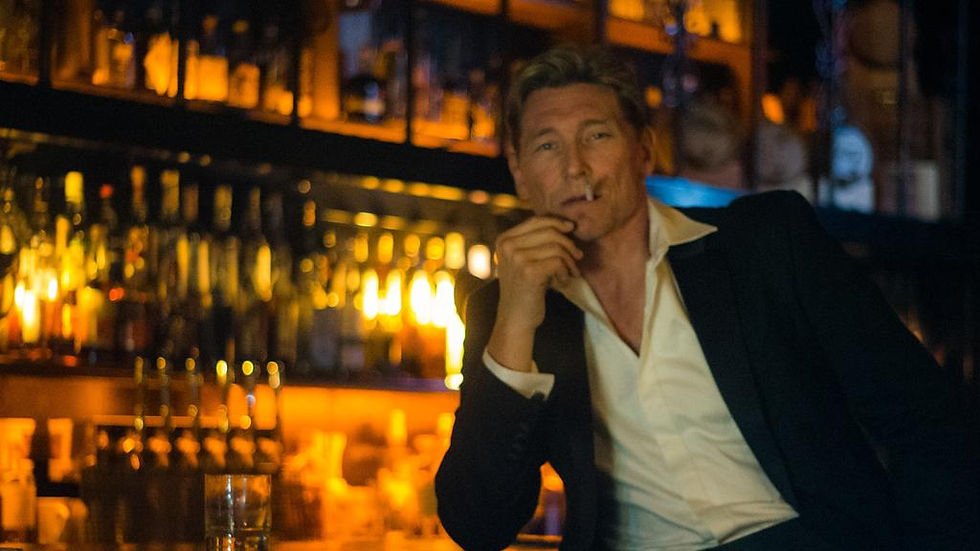Review: Last Dance, The Forgotten Masters at The Space Theatre, Adelaide Festival Centre
- Theatre Travels

- Jun 17, 2019
- 3 min read
By Lisa Lanzi
Brisbane born-world traveller and triple threat royalty Aaron Cash brought his energy to the stage for the 2019 Adelaide Cabaret Festival with a virtuosic one-person show Last Dance, The Forgotten Masters. With simple set (hat stand, bar, grand leather lounge chair) and wonderful musicians on drums, keys and trumpet, Cash channels three composite but imaginary characters and a plethora of excellent accents. He describes this show he has written, directed and choreographed as a homage to dance and dancers. It is a compilation of many personalities encountered during his career, with true stories woven in; a tribute to ‘those that came before and those that will come after” and who show us how to live that life of a dancer/performer.
The first drink is Schnapps and we meet Gunther Von Pantzapffel from 1931, the ‘most famous choreographer in Berlin’ who worked with Marlene Dietrich’. This character is responsible for the invention of ‘the Unch’, a step sadly ‘stolen’ in later years by Martha Graham, Jack Cole, Ruth St Denis and Ted Shawn. As my plus one pointed out, some of the humour would have been lost on those not cognisant of dance terms and a little dance history. I found it hilarious that the stolen move eventually morphed into the ‘contraction’ which any contemporary dancer can tell you about. Intricacies of dance aside, Cash’s embodiment of ‘Gunther’ was sublime with deep nuances around the issues of homosexuality and Judaism in Hitler’s Berlin and later in the southern United States. Von Pantzapffel solemnly lectures us as his life drains away, tied to a tree and beaten by ‘Nazi-hating’ youths, that ‘intolerance is like a weed and it should be plucked out of every garden’. Cash’s German accent was fairly consistent, the story flowed and the snippets of dance were superb. There were also some brilliant Southern American accents, Cash snapping from one to another impeccably, including a yokel with a stutter.
After a short band interlude and costume change Cash returns to knock back a glass of Spanish Rioja so that we may be introduced to Rafael Bonnac Aranjuezella Garcia, the ‘most famous Flamenco master in the world’… or was that ‘Flamenco Stripper’? This character is of the gypsy (gitanos) blood and oozes sexuality because the ‘goddess of the dance requires it’, even though he has not once kissed a woman. Fortunately, there is time for a moment on stage with a female audience member before Rafael’s untimely death due to a tarantula bite - but death comes only after a furious ‘strip tarantella’ as spider-bite fever overtakes. Again, the accent is very plausible, the story humorous and the Flamenco passionate and exacting. Even with his hip replacement, Cash’s dance moves are spectacular.
Another stellar band moment and another costume change allows Cash to return as Peter Brown, a.k.a Con Temporary, a self-aggrandising performance artist from the 1970s who invented a dance step called ‘The Poughkeepsie’ and was simply too extraordinary, or not, depending on who spoke about him and his ‘art’. This section was a little manic and slightly hard to follow at times. Partly set as a documentary (with TV screen prop) Cash brilliantly flipped back and forth between many characters and accents to reveal the intricacies of Con Temporary’s life. A section of choreography was played out with two awesome gentlemen from the audience with hilarious movement cues like ‘chicken dance’ or ‘side Egyptian’. Once again, deeper undertones appear in this scene reflecting on the early days of the emergence of AIDS and the loss of so many artistic souls. A few biting observations of dance culture also emerge: ‘you’re a boy, you don’t have to work that hard’ and the ‘cruelty method’ of ballet teaching ‘a little technique, a little mental and physical torture’.
At last, Aaron Cash is back in his own persona and re-robes onstage in black attire and patent shoes as he ponders the finite career of a dancer and that heroic vocation that so many have a passion for. He ends with a beautiful rendition of Pennies From Heaven and some stylish tap dancing (Cash was one of the original Tap Dogs). This is an hour and ten minutes of sparkling, energetic and capable showmanship, another Australian making his mark on the world stage.

All opinions and thoughts expressed within reviews on Theatre Travels are those of the writer and not of the company at large.




